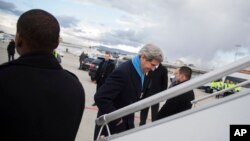U.S. Secretary of State John Kerry says negotiators in the Iran nuclear talks have “made some progress” from where they were but “there are still significant gaps and important choices that need to be made.”
He commented on Wednesday after wrapping up three days of talks with Iranian Foreign Minister Mohammad Javad Zarif in Montreux, Switzerland.
Kerry said negotiators continue to focus on reaching the “right deal,” which he said would be one that “closes off any paths that Iran could have towards fissile material for a weapon.”
He said the right agreement would also “protect the world from the enormous threat” that a nuclear-armed Iran would pose.
Iran's President Hassan Rouhani said Wednesday that, while Tehran would agree to more transparency, it would not accept ending its nuclear program, which it says does not have a military component.
According to Iranian state media, Rouhani outlined two outcomes for the ongoing multilateral negotiations: making a deal, or "a more speedy growth of Iran's peaceful nuclear program."
Kerry is now traveling to Saudi Arabia, where he will try to assure Gulf Cooperation Council (GCC) members that an Iran nuclear deal would not lead to regional instability.
Gulf officials jittery
In Saudi Arabia, Kerry and GCC foreign ministers will meet on Thursday at the Riyadh Air Base. The group includes the Bahrain, Kuwait, Oman, Qatar, Saudi Arabia, and the United Arab Emirates. Later Thursday, Kerry will hold talks with Saudi King Salman at his ranch northwest of Riyadh, and meet other officials, including the country’s foreign and interior ministers.
Gulf state officials have expressed concern that a nuclear deal with Tehran could bolster Iran’s economic clout and its Shi’ite Muslim influence in the region.
During a briefing Wednesday, a senior State Department official said regularly updating GCC partners on the status of Iran nuclear talks is “part of the process.”
The senior official described talks in Montreux as “intense” with “some progress but a lot of challenges ahead.”
The official said Kerry and Zarif are expected to meet again on March 15, possibly in Geneva. The official said EU foreign policy delegate Helga Schmidt would be present at the talks.
The official also said President Barack Obama will make an assessment at the end of the month on whether it is worthwhile to proceed with the talks. The senior official said the world powers engaged in talks with Iran are generally in agreement on what terms need to be in place in order to proceed.
The United States and the other world powers who make up the five permanent members of the U.N. Security Council and Germany, the so-called P5 + 1, aim to reach a framework agreement with Iran by March 31 and a final deal by July 1.
Iran is looking for a deal that provides relief from international sanctions. World powers are seeking an agreement that provides assurances that Iran cannot produce nuclear weapons.
State Department points out inaccuracies in Netanyahu speech
On Tuesday in Washington, Israeli Prime Minister Netanyahu said he felt a “profound obligation” to speak out about a possible nuclear deal with Iran because he believed it would threaten the survival of his country.
Addressing a joint meeting of Congress, he said an Iran nuclear agreement would be a “bad deal.” It “doesn’t block Iran’s path to the bomb, it paves its path to the bomb,” he said.
Kerry Wednesday echoed a critique by President Obama of Netanyahu's speech that the Israeli leader failed to offer a more viable alternative, adding "simply demanding that Iran capitulate is not a plan, and nor would any of our P5+1 partners support us in that position.
Also Wednesday, the State Department released a statement which it took issue with some of the comments that Netanyahu made about Secretary Kerry.
In his speech, Netanyahu said Kerry had “confirmed” that Iran could “legitimately possess” 190,000 centrifuges enriching uranium by the end of a long-term nuclear agreement.
State Department spokeswoman Jen Psaki said that Kerry, in Congressional testimony last month, actually said that if there is a civilian power plant that is “producing power legitimately and not a threat to proliferation, you could have as many as 190,000 or more centrifuges.”
Focus on Yemen, Islamic State
In Saudi Arabia, Kerry and Gulf officials are also expected to discuss Yemen’s unrest, which has taken on some sectarian overtones.
Houthi rebels seized control of the capital in January and placed U.S.-backed President Abd Rabbuh Mansour Hadi under house arrest. Earlier this month, Hadi fled detention and went to a new base in the southern city of Aden.
On Tuesday, a senior State Department official said Kerry and other officials will tell the GCC states that the U.S. believes the only way forward in Yemen is through a continuation of political negotiations that have been led by U.N. Secretary-General Ban Ki-moon and special envoy Jamal Benomar.
Kerry and GCC state officials also are expected to discuss efforts to fight Islamic State militants in Iraq and Syria.
The senior State Department official said GCC states have been “strong partners” in efforts to combat IS, noting that Saudi Arabia had agreed to work with the U.S. in establishing a facility to train and equip Syria’s moderate opposition. The official said the facility would be launched in Saudi Arabia “in the coming months.”
After his talks in Saudi Arabia, Kerry is scheduled to meet with officials in London and Paris before returning to Washington.
Victoria Macchi contributed to this report in Washington




